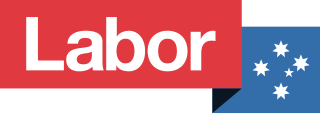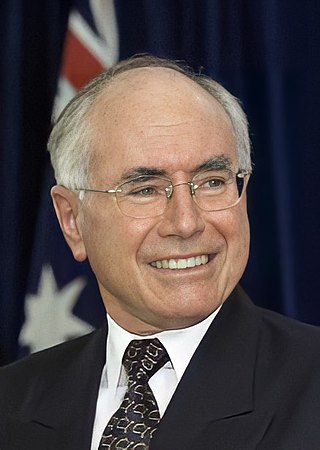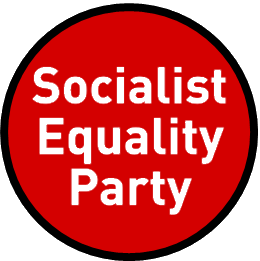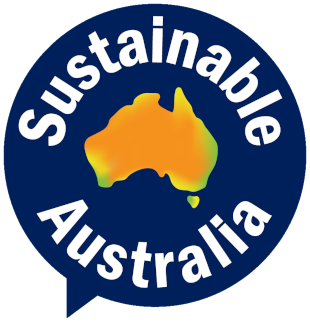
The Australian Labor Party (ALP), also simply known as Labor, is the major centre-left political party in Australia, one of two major parties in Australian politics, along with the centre-right Liberal Party of Australia. The party has been governing federally since being elected at the 2022 election, and with political branches in each state and territory, they are currently in government in New South Wales, Queensland, South Australia, Victoria, Western Australia, the Australian Capital Territory, and the Northern Territory – Tasmania is the only state or territory where they currently form the opposition. It is the oldest political party in Australia, being established on 8 May 1901 at Parliament House, Melbourne, the meeting place of the first federal Parliament.

The Australian Democrats is a centrist political party in Australia. Founded in 1977 from a merger of the Australia Party and the New Liberal Movement, both of which were descended from Liberal Party dissenting splinter groups, it was Australia's largest minor party from its formation in 1977 through to 2004 and frequently held the balance of power in the Senate during that time.
In politics, a red–green alliance or red–green coalition is an alliance of "red" parties with "green" parties. The alliance is often based on common left political views, especially a shared distrust of corporate or capitalist institutions. While the "red" social-democratic parties tend to focus on the effects of capitalism on the working class, the "green" environmentalist parties tend to focus on the environmental effects of capitalism.
The Labor Right, also known as Modern Labor, is a political faction of the Australian Labor Party (ALP) at the national level that is characterised by being more economically liberal and, in some cases, more socially conservative. The Labor Right is a broad alliance of various state factions and competes with the Labor Left faction.

Socialist Alliance is a socialist political party and activist organisation in Australia. The party was founded in 2001 as an alliance of various socialist organisations and activists. Engaging in a combination of grassroots activism and electoral politics, Socialist Alliance currently has two elected officeholders across Australia, all of whom serve on the local government level. They are councillors Sue Bolton and Rob Pyne. Sam Wainwright served as a Socialist Alliance councillor on the City of Fremantle until 2021.

The Democratic Socialist Perspective (DSP) was an Australian Marxist political group, which operated as the largest component of a broad-left socialist formation, the Socialist Alliance. In 2010, the DSP voted to merge into the Socialist Alliance.
An electoral alliance is an association of political parties or individuals that exists solely to stand in elections.

The 2004 Australian federal election was held in Australia on 9 October 2004. All 150 seats in the House of Representatives and 40 seats in the 76-member Senate were up for election. The incumbent Liberal Party of Australia led by Prime Minister of Australia John Howard and coalition partner the National Party of Australia led by John Anderson defeated the opposition Australian Labor Party led by Mark Latham.
Liberalism in Australia dates back to the earliest Australian pioneers and has maintained a strong foothold to this day. Liberalism in the country is primarily represented by the centre-right Liberal Party. The Liberal Party is a fusion of liberal and conservative forces and are affiliated with the conservative centre-right International Democrat Union. Philosophical liberals are often called a "small-l liberal" to distinguish them from conservative members of the Liberal Party.

Brazil elects on the national level a head of state—the president—and a legislature. The president is elected to a four-year term by absolute majority vote through a two-round system. The National Congress has two chambers. The Chamber of Deputies has 513 members, elected to a four-year term by proportional representation. The Federal Senate has 81 members, elected to an eight-year term, with elections every four years for alternatively one-third and two-thirds of the seats. Brazil has a multi-party system, with such numerous parties that often no one party has a chance of gaining power alone, and so they must work with each other to form coalition governments.

The politics of Australia take place within the framework of a federal parliamentary constitutional monarchy. Australia has maintained a stable liberal democratic political system under its Constitution, the world's tenth oldest, since Federation in 1901. Australia is the world's sixth oldest continuous democracy and largely operates as a two-party system in which voting is compulsory. The Economist Intelligence Unit rated Australia a "full democracy" in 2022. Australia is also a federation, where power is divided between the federal government and the states and territories.

The Socialist Equality Party (SEP) is an unregistered Trotskyist political party in Australia. The SEP was established in 2010 as the successor party to the Socialist Labour League, which was founded in 1972 as the Australian section of the International Committee of the Fourth International (ICFI).
A minor party is a political party that plays a smaller role than a major party in a country's politics and elections. The difference between minor and major parties can be so great that the membership total, donations, and the candidates that they are able to produce or attract are very distinct. Some of the minor parties play almost no role in a country's politics because of their low recognition, vote and donations. Minor parties often receive very small numbers of votes at an election. The method of voting can also assist or hinder a minor party's chances. For example, in an election for more than one member, the proportional representation method of voting can be advantageous to a minor party as can preference allocation from one or both of the major parties.

Trade Unionist and Socialist Coalition (TUSC) is a socialist electoral alliance launched in Britain for the 2010 general election.

The Sustainable Australia Party, formerly the Sustainable Population Party, is an Australian political party formed in 2010.

Katter's Australian Party (KAP) is an agrarian political party in Australia. It was founded by Bob Katter, an independent and former Nationals MP for the seat of Kennedy, with a registration application lodged to the Australian Electoral Commission in 2011.
Socialism in Australia dates back at least as far as the late-19th century. Notions of socialism in Australia have taken many different forms including utopian nationalism in the style of Edward Bellamy, the democratic socialist reformist electoral project of the early Australian Labor Party (ALP), and the revolutionary Marxism of parties such as the Communist Party of Australia.
A landslide victory is an election result in which the victorious candidate or party wins by an overwhelming margin. The term became popular in the 1800s to describe a victory in which the opposition is "buried", similar to the way in which a geological landslide buries whatever is in its path. What constitutes a landslide varies by the type of electoral system. Even within an electoral system, there is no consensus on what sized margin makes for a landslide.
The Australian Progressives is a minor Australian political party established in September 2014.

The Australian Federation Party (AFP), formerly known as the Country Alliance and the Australian Country Party, is an Australian political party. Founded in 2004 by four rural Victorians, the party lodged its initial registration with the Victorian Electoral Commission on 15 August 2005.












